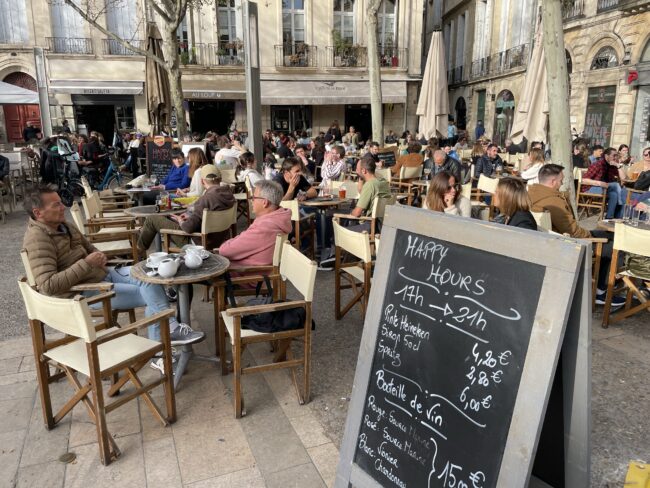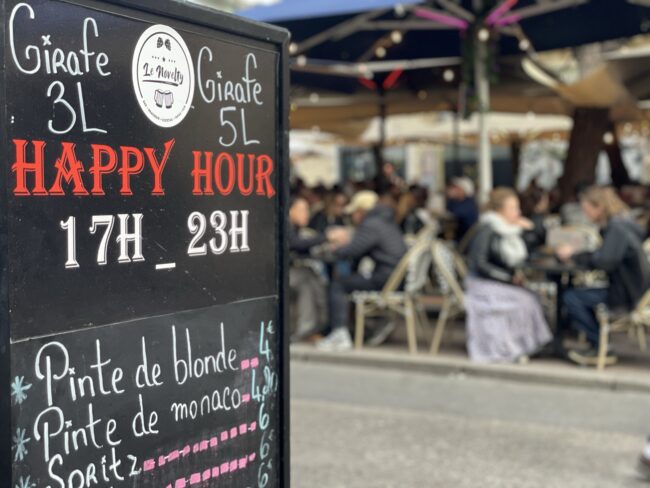The workday is over, and it’s time to go meet some friends for a drink or two at the local terrasse. With every round, and every new arrival, you’d better be prepared to raise your glass and cheers in French!
That’s right, le happy hour, also known as le cinq à sept, is a French tradition for winding down at the end of the workday, so properly clinking glasses is one of the rituals you’re bound to need pretty quickly.
So what should you expect? Let’s start off this post with some basics on French happy hour etiquette, and then get into the various expressions for Cheers in French that you’re sure to hear and use!
This article is brought to you by LingoCulture, Where you can get unlimited private French classes via Zoom with native teachers for a flat monthly rate. It’s the closest thing to immersion you can get without living in a French-speaking country. Click here to learn more.
French happy hour traditions
Well it’s that time of day, and you’re gathering with quelques potes (a few pals) on a lively terrasse (a place with outdoor seating) for un verre ou trois (a glass or three). Vive le cinq à sept ! (Long live the happy hour!)
First of all, this institution is known affectionately in France as le happy hour. Its other name is le cinq à sept, which translates literally to the five to seven, in reference to the typical time of day when we gather for afternoon drinks. Most bars have drink specials for happy hour, often spanning a wider timeframe than 5 to 7.

Whether you arrive first, or other people join you, the first obligation is a full round of greetings. That’s right, even if there are ten people, be sure to greet each and every person individually! For this step in your happy hour, check out our post with a variety of French greetings, as well as instructions on how to do la bise (little cheek kisses).
Now it’s time to order a drink. Since the night is young, it’s quite common for people to start with un démie, which is a half pint of beer, measuring 0.25 liters. Don’t worry though, it’s just as common to order une pinte, which is half a liter of beer, or of course anything else from wine to cocktails. Some bars can even provide tables with une girafe, which is a big multi-liter vat of beer with a tap on it, so groups of friends can keep refilling their glasses as fast as they empty them. If you want the beer that’s on special for happy hour, you can just ask for “une bière happy!”

In general, your server will keep track of who orders what, so when you’re ready to leave you just pay your own consommations (the drinks you consumed). If one of your friends paie la tournée (pays for the round) though, custom has it that each person pays for another round!
Snack foods are very common at happy hour, and these are usually shared among everyone at the table. If you want something à grignoter (to snack on), you can often order olives, chips, des cacauhètes (peanuts), fromage (cheese), or saucisson (cured sausage), often avec du pain (bread). Bon appétit!
If you’re having fun, watch out because the drink specials might come to an end soon. Be sure to order your last bière happy! When it’s time to go, it’s time to pay, and then make the rounds to say goodbye to everyone individually again. À la prochaine! For more parting expressions, here’s a good post with 10 ways to say goodbye in French.
How to cheers in French
Cheers in French is not just a noun, but a verb: trinquer. We’re not talking about cheering here, like we do for Tour de France cyclists, but rather cheersing with our friends over a tournée au happy hour.
How do we cheers in France? We look into each other’s eyes as we clink our glasses together, we don’t cross our cheersing glasses over another pair of clinking glasses, we make sure to cheers to everybody, and only once everyone has cheersed each other can we (or rather must we) then take a sip.
If someone else joins our group, everyone needs to then cheers that person too, though we don’t all need to cheers each other again. Maybe until the next round arrives!
Expressions for Cheers in French
Now that we know what to do, it’s time to learn the various expressions for cheers in French!
Santé
Santé is the classic French expression for cheers. It’s quick, it works in formal and informal situations, and it’s suitable one-on-one and in groups. Just raise your glass and say santé!
The perfect response when someone cheerses you with santé is to just repeat it back with a smile and another santé!
Literally, santé in English translates as health. It’s a straight equivalent of the most common Spanish cheers: salud.
À ta santé, À votre santé
This expression is simply translated as to your health, and it’s a bit more formal than the shortened version we saw above.
À ta santé is to be used when addressing a friend, while à votre santé is for when you address a group or when you address an individual you don’t know as well. This is simply because “ta” and “votre” are the possessive adjectives for “your” corresponding respectively to “tu” and “vous.” If you’re unfamiliar with this differentiation, see our beginner post on tu vs vous.
À la tienne, À la vôtre
Similar to the last expression, the literal translation of this one is to yours.
Cheersing with à la tienne or à la vôtre is another means of toasting the health of those around you. It’s implicitly polite, as a way of telling whoever you’re with that you’re pleased to be in their company and that you wish them the best.
There’s a funny rhyming variation on this one you might hear from time to time: à la tienne, Étienne. Don’t worry, they didn’t get your name wrong! This popular version is just used in jest, and comes from a drinking song.
À la nôtre
As a variation of the previous expression, this one includes both the speaker and whoever they’re cheersing. It’s a good option to celebrate being together. It’s very suitable on a date, while in a group setting it can foster camaraderie. À la nôtre in English literally translates as to ours, though a better interpretation in this context of a toast in French is to us.
Tchin, Tchin tchin
This onomatopoetic expression comes from the sound of two glasses clinking together. Whereas in English you might write this sound out as clink clink, or as chinchín in Spanish, in French we say and write tchin tchin!
Tchin tchin is a quick and easy call for everyone to cheers, as well as a response. It’s also common to say a single tchin out loud with a smile, as you clink your glass against your friend’s.
Trinquons, On trinque?
These two expressions are the suggestions based the verb trinquer, meaning to cheers. If the time is right and you want to propose that everyone raise their glass together, you just say “On trinque?” and raise your glass first, and everyone else is likely to follow along with a hearty “Santé!”
On trinque? is pretty informal, perfect among friends or family gathered around a table. Alternatively, you can say Trinquons?, which means the same thing but conjugated slightly more formally (see our post covering on vs nous for a discussion of this nuance).
Trinquons can also be used in the command form to ask everyone in your party to raise their glasses, for example at the end of a toast. In such a context, those of us in the group may call out tchin ! as we raise our glasses, as an affirmation that nous trinquons.
Porter un toast
Now that you know the different ways to say cheers in French, you’re ready to make a toast. In French, this term is nearly identical: porter un toast. Here’s where we offer a heartfelt message and ask each of our companions à lever son verre (to raise their glass) to share in the sentiment.
Let’s see a few occasions for porter un toast. Note that we’ll use the preposition à to introduce the object of our toast:
- J’aimerai porter un toast aux mariés. – I would like to make a toast to the newlyweds!
- Je lève mon verre à Simon pour son nouveau travail. Trinquons ! – I raise my glass to Simon for his new job. Let’s cheers!
- À votre réussite ! – To your success!
Cul sec, Et glou et glou
We’ll leave you with this final tradition to end the night, which is to chug your drink in one go. Un cul sec translates literally as a dry ass, and refers to the bottom of your glass once you’ve poured your whole drink down your throat. If everyone else is ready to go and you still have half a beer, they’ll probably suggest un cul sec as a quick solution.
Likewise, glou glou is the onomatopoetic term for the act of chugging, equivalent to glug glug in English. It’s also fun to chant, so if you hesitate you might have several friends suddenly imploring you in unison to glou et glou et glou! Note that this very informal expression is more spoken than written, so it may also appear as iglu iglu, iglou iglou, or igloo igloo in French.
In any case, if your cinq à sept has reached the point of drinking a cul sec and chugging igloo igloo, it’s probably time to call it a night!
Conclusion: Cheers in French
After all that, are you ready to find a lively terrasse and join your potes for le cinq à sept? We covered everything you need to know here, from the essential French happy hour traditions to the various ways to say cheers in French.
We hope this has given you a thirst for more, and that you’re encouraged to practice it all over a few rounds among friends. À la vôtre !